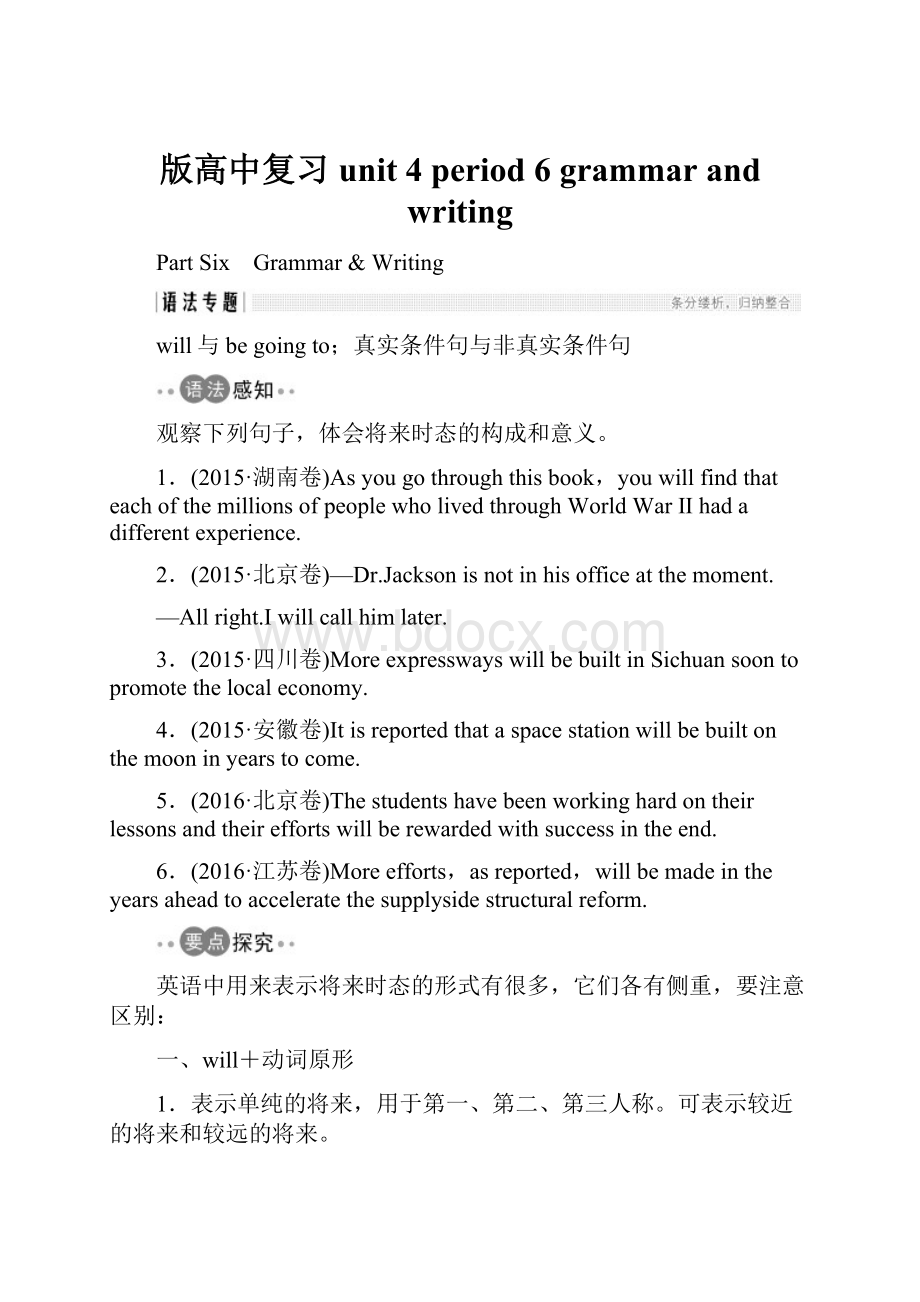版高中复习unit 4 period 6 grammar and writing.docx
《版高中复习unit 4 period 6 grammar and writing.docx》由会员分享,可在线阅读,更多相关《版高中复习unit 4 period 6 grammar and writing.docx(14页珍藏版)》请在冰豆网上搜索。

版高中复习unit4period6grammarandwriting
PartSix Grammar&Writing
will与begoingto;真实条件句与非真实条件句
观察下列句子,体会将来时态的构成和意义。
1.(2015·湖南卷)Asyougothroughthisbook,youwillfindthateachofthemillionsofpeoplewholivedthroughWorldWarⅡhadadifferentexperience.
2.(2015·北京卷)—Dr.Jacksonisnotinhisofficeatthemoment.
—Allright.Iwillcallhimlater.
3.(2015·四川卷)MoreexpresswayswillbebuiltinSichuansoontopromotethelocaleconomy.
4.(2015·安徽卷)Itisreportedthataspacestationwillbebuiltonthemooninyearstocome.
5.(2016·北京卷)Thestudentshavebeenworkinghardontheirlessonsandtheireffortswillberewardedwithsuccessintheend.
6.(2016·江苏卷)Moreefforts,asreported,willbemadeintheyearsaheadtoacceleratethesupplysidestructuralreform.
英语中用来表示将来时态的形式有很多,它们各有侧重,要注意区别:
一、will+动词原形
1.表示单纯的将来,用于第一、第二、第三人称。
可表示较近的将来和较远的将来。
He'llcomebacksoon.他很快就会回来。
Thenewlawwillcomeintoforcenextspring.
新法律将在明年春天生效。
2.表示一种倾向或习惯性的动作。
He'lltalkforhoursifyougivehimthechance.
如果你让他说,他会说上几个小时。
EverySunday,wewillgohiking.
每个星期天,我们都会去远足。
3.表示说话人的意愿、希望、命令、请求等。
Chinawillbecomeoneoftherichestcountriesintheworld.
中国会成为世界上最富有的国家之一。
YouwilldoasItoldyou.你得按我说的做。
4.表示说话人的猜测。
Shewillbeallrightaftertakingthemedicine.
服了药后她会好起来的。
5.表示临时决定。
—Haveyoupostedthelettersforme?
—Sorry,Iforgot.I'llpostthemrightaway.
——你替我把信寄出去了吗?
——对不起,我忘了。
我马上就去寄。
二、begoingto+动词原形
1.表示事先考虑后决定做某事,通常译为“打算,准备”。
I'mgoingtosellthisoldcarandbuyanewone.
我打算卖掉这辆旧车,然后买辆新的。
2.表示有迹象表明即将发生的动作或出现的情况,通常表示较近的将来。
Lookatthesedarkclouds—there'sgoingtobeastorm.
看看这些乌云——暴风雨就要来了。
[易混辨析] will/begoingto
will
常表示说话人相信或希望要发生的事情,可以指遥远的将来;只表示单纯的将来,无按规定或计划之意
begoingto
常表示事情很快就要发生;可以表示打算做某事,会有主观意愿;也可表示按计划或安排要发生的动作;可用来表示自然现象
三、表示将来的其他方式
1.表示趋向行为的动词如come,go,leave,start,begin等常用进行时形式表示将来时。
IamleavingforBeijingtomorrow.
我明天要去北京。
Heiscominghereinanhour.
他将在一个小时之后来这里。
2.“beaboutto+动词原形”表将来。
“beaboutto+动词原形”表示打算或根据安排即将发生的动作。
它不与表示时间的副词或其他时间状语连用。
TheEnglisheveningisabouttostart.
英语晚会即将开始。
Theyareabouttosetout.
他们就要出发。
3.betodo用于一般将来时,表示即将或注定将要发生的事,有时也可表示“应该,必须,想要”等意思。
Wewonderwhatistobedonenext.
我们想知道接下来将会发生什么事情。
YouaretohandinthenamelistbeforethisSunday.
在这星期天以前你必须把名单交上。
4.在表示按时刻表(如车站、机场等)将要发生的动作时,常用一般现在时表将来。
Whendoesthefirsttrainleavetomorrow?
明天第一班火车什么时候出发?
Ⅰ.用will或begoingto的适当形式填空
1.—Weare_going_tohaveapartynextweekend.Wouldyouliketocome?
—Yes,I'dliketo.Thankyou.
2.—LookatSophie.
—Hereyesareclosing.Sheis_going_tofallasleep.
3.—I'mbusygettingthingsreadyatthemoment.
—Wewillhelpyouifyoulike.
4.—What'sJanedoingthesedays?
—She'sstudyingmedicine.Sheis_going_tobeadoctor.
5.—Thiscarismakingafunnynoise.
—Yes,itis_going_tobreakdownatanymoment.
Ⅱ.用所给动词的适当形式填空
1.Iwill_go(go)withyouifIhavetime.
2.Hurryup!
Orwewill_be(be)late.
3.Whatareyougoing_to_do(do)tomorrowafternoon?
4.Jennywill_do(do)anexperimentthedayaftertomorrow.
5.Ifsheisn'tfreetomorrow,shewon't_take(nottake)partintheparty.
6.—Ineedsomepaper.
—Iwill_bring(bring)someforyou.
7.Are(be)youfreetomorrow?
8.Theywon't_leave(notleave)untilyoucomeback.
9.Shallwego(go)tothepartytogetherthisafternoon?
10.Theywanttoknowwhenthemeetingwill_start(start).
观察下列句子,体会条件句的结构和意义。
1.(2016·浙江卷)Asuddenstopcanbeaveryfrighteningexperience,especiallyifyouaretravellingathighspeed.
2.(2015·江苏卷)Itissocoldthatyoucan'tgooutsideunlessfullycoveredinthickclothes.
3.(2016·北京卷)Whydidn'tyoutellmeaboutyourtroublelastweek?
Ifyouhadtoldme,Icouldhavehelped.
4.(2016·江苏卷)Ifithadnotbeenforhisinvitationtheotherday,Ishouldnotbeherenow.
5.(2016·天津卷)Iwaswearingaseatbelt.IfIhadn'tbeenwearingone,Iwouldhavebeeninjured.
6.(2016·浙江卷)Hadthegovernmentsandscientistsnotworkedtogether,AIDSrelateddeathswouldnothavefallensincetheirhighestin2005.
7.(2015·北京卷)IfIhadn'tseenitwithmyowneyes,Iwouldn'thavebelievedit.
8.(2015·重庆卷)Withouthiswartimeexperiences,Hemingwaywouldn'thavewrittenhisfamousnovelAFarewelltoArms.
9.(2015·天津卷)IwishIhadbeenatmysister'sweddinglastTuesday,butIwasonabusinesstripinNewYorkthen.
10.(2015·陕西卷)Ellenisafantasticdancer.IwishIhaddancedaswellasher.
11.(2015·福建卷)—Sorry,Mum!
Ifailedthejobinterviewagain.
—Oh,it'stoobad.Youshouldhavemadefullpreparations.
12.(2015·江苏卷)ItmighthavesavedmesometroublehadIknowntheschedule.
13.(2015·安徽卷)Itisluckywebookedaroom,orwewouldhavenowheretostaynow.
包含条件状语从句的句子通常称为条件句。
英语中的条件句分为真实条件句和虚拟条件句(也叫非真实条件句)两种。
一、真实条件句
1.真实条件句用陈述语气,假设的情况可能发生,其中if是“如果”的意思。
条件状语
主句
意义
一般现在时
shall/will+动词原形
未来可能发生的情况
一般现在时
祈使句
用于向某人提供建议、命令
一般现在时
一般现在时
表示根据条件,经常或总是会发生的事,或者真理
Ifitrainstomorrow,wewon'thavethesportsmeeting.
如果明天下雨的话,我们就不举行运动会了。
Ifyouknowtheanswer,putupyourhandsplease.
如果你们知道答案,请举手。
Iflionsarehungry,theyhuntotheranimals.
如果狮子饿了,它们就猎食其他动物。
2.在真实条件句中,有时也可用“unless+一般现在时”谈论现在和未来要发生的事。
此时unless相当于if...not...,但并不是任何时候它们都能互换,特别是当从句的动作或事情不发生,主句的情况才能发生时,只能用if...not...。
Youwillnotsucceedunlessyouworkhard/ifyoudon'tworkhard.
除非你用功,否则你就不会成功。
Iwillbesurprisedifhedoesn'thaveanaccident.
他要是不出事,我倒会感到奇怪。
(不可用unless)
二、非真实条件句
非真实条件句用虚拟语气,if引导的非真实条件句可以表示过去、现在和将来的情况。
它的基本特点是时态前移。
时间
从句
主句
与现在事实相反
If+主语+did/were(动词过去式)
主语+would/could/might/should+动词原形(do/be)
与过去事实相反
If+主语+haddone/been(动词过去完成时)
主语+would/could/might/should+havedone/been
与将来事实相反
①If+主语+did(动词过去式)
②If+主语+weretodo
③If+主语+should+do/be(动词原形)
主语+would/could/might/should+动词原形(do/be)
IfIhadtime,Iwouldcertainlyjoinyouinthetennismatch.
我要是有时间肯定和你一起打这场网球比赛。
(事实是:
我没有时间)
Ifhehadtakenmyadvice,hemightnothavemadesuchabadmistake.
要是他听进了我的劝告就不会犯这么严重的错误了。
(事实是:
他没有听我的劝告)
三、其他情况的条件句
1.省略if的非真实条件句
条件句中有were,had,should时,可把if省略,而把were,had,should放在主语前,构成倒装结构,这种结构主要用于书面语中。
Wereitnecessary,Imightresign.
如果需要的话,我可以辞职。
Hadyouinformedmeearlier,Iwouldn'thavesignedthecontract.
要是你早点告诉我的话,我是不会签那份合同的。
Shoulditraintomorrow,wewouldhavetoputoffthevisittotheYangpuBridge.
如果明天下雨,我们就得推迟参观杨浦大桥。
2.错综时间条件句
在这种虚拟语气中,主句和从句的动作发生的时间不一致。
因此,主句和从句的谓语动词要根据各自所指的不同时间选择适当的动词形式。
IfIwereyou,Iwouldn'thavemissedthefilmlastnight.(从句与现在事实相反,主句与过去事实相反)
如果我是你,就不会错过昨晚那场电影。
Iftheyhadstartedintheearlymorning,theywouldarriveinhalfanhour.(从句与过去事实相反,主句与将来事实相反)
要是他们一大早就出发的话,再过半小时就该到了。
Ifyouhadaskedhimwhenyousawhimlasttime,youwouldknowwhattodonow.(从句与过去事实相反,主句与现在事实相反)
如果上次你看到他时问他一下,现在就知道该怎么做了。
3.含蓄条件句
不是用条件句而是由介词短语(without没有,butfor要不是)、连词(but但是)、副词(otherwise否则)等或上下文来表示某种假设的情况。
Withoutelectricity,lifewouldbequitedifferenttoday.
(=Iftherewerenoelectricity...)
没有电,今天的生活就完全不一样了。
注意:
在suggest(建议),advise,order,demand(命令),request,require,desire(要求)和insist(坚持)之后的宾语从句中,谓语动词用“should+动词原形”,其中should可以省略。
Mothersuggeststhatwe(should)eatoutforachangethisweekend.妈妈建议本周末到外面吃,换换口味。
Ⅲ.用所给动词的适当时态填空
1.IfIsaw/should_see/were_to_see(see)MorinanextMonday,Iwouldtellheraboutit.
2.Henrystudiedveryhard;otherwisehemight/could/would/should_have_failed(fail)theexams.
3.Whatwillyoudoifitrains(rain)thedayaftertomorrow?
4.IwouldgoandseeMr.BrownifIknew(know)hisaddress.
5.WereIyou,Ishould/would/could/might_ask(ask)himtoleaveimmediately.
6.Ifyouhad_arrived(arrive)fiveminutesearlier,youwouldhavecaughtthetrain.
7.Iftheearthhad(have)nogravity,whatdoyouthinkwouldhappen?
8.Ifyougototheparty,youwill_have(have)awonderfultime.
9.Ifhehadn'tfollowedyouradvice,hewould/could/should/might_have_made(make)aseriousmistake.
10.Were(be)sheto_leave(leave)tomorrowmorning,hewouldgettherebyFridayafternoon.
Ⅳ.完成句子
1.IfPeterhad_been_present,hewouldhaveofferedanypossiblehelptothepeoplethere.
如果彼得在场的话,他就会为那里的人提供任何可能的帮助。
2.Had_he_caught/If_he_had_caughtthelastsubway,hewouldnothavebeenlateforthemeeting.
要是他赶上了上一趟地铁,他开会就不会迟到了。
3.Welostourwayyesterday,otherwisewewould/could/should/might_have_visitedmoreplacesofinterest.
我们昨天迷路了,否则我们会参观更多的名胜。
4.IfIhad_toldyouhowtodoityesterday,youwould/could/should/might_finishitnow.
如果昨天我告诉你如何做此事,现在你就完成了。
5.If_it_rained/should_rain/were_to_rain_或Should_it_rain/Were_it_to_raintomorrow,thesportsmeetingwouldbeputofftillnextweek.
如果明天下雨的话,运动会将推迟到下周。
如何写一个网页
随着计算机的普及,网页制作也日益成为人们必须掌握的一项基本技能。
网页的制作因其内容的不同,形式也不完全一样。
本单元的写作话题是地点介绍,属于说明文体。
常常是对一个国家、地区或城市的简介,一般包括地理位置、人口、气候、环境、物产与历史文化等。
时态多用一般现在时。
[写作步骤]
1.列出网页内容的提纲
(1)IntroductionandHistory:
包含该地方的地理位置、主要特色、人口和历史等;
(2)Thingstosee:
介绍值得参观的地方和著名景点等;
(3)Thingstodo:
包括运动、旅游和节日活动等。
2.根据所列提纲写出主要词汇和句子。
3.用恰当的连接词将所写句子连成完整的段落。
[常用句式]
1....isthelargest/second/themostbeautifulcityin...
2.Itislocatedinthenorth/west/east/southof...
3.Ithasapopulationof...
4.Itis...withalonghistory./Ithasahistoryof...
5.Thecityisanimportantcentreforpolitics,business,culture,andindustry.
6.Thehistoryofthecitycangobackto...
7.Itiseasytotravelbetween...andtherestof...
8.Inthecity,youcanenjoyanamazingviewof...
9....isoneofthebestattractionsintheworld.
10.Inaword,youwillnotfeellonelywhereveryouarefrom...
[典型例题]
请根据下面所给的提示,制作一个介绍上海的网页。
1.上海位于我国大陆海岸线中部的长江口,人口超过2000万;中国的经济、金融、贸易和航运中心;如今已发展成为一个国际化大都市;它还是2010年世博会的举办城市。
2.上海有许多景点,如东方明珠电视塔、上海迪斯尼乐园、上海博物馆和上海世博园等。
每年都举办像上海旅游节等精彩的活动。
3.你可以在上海亲身体验攀岩和水上活动,还可以在大型商场购物,并且可以品尝上海美食。
参考词汇:
东方明珠电视塔theOrientalPearlTVTower;上海迪斯尼乐园ShanghaiDisneyland;上海世博园ShanghaiWorldExpoSite;攀岩rockclimbing;大都市metropolis
[审题谋篇]
1.构建框架
结合短文要求,可以分三部分来进行介绍:
(1)Introduction:
包括上海的地